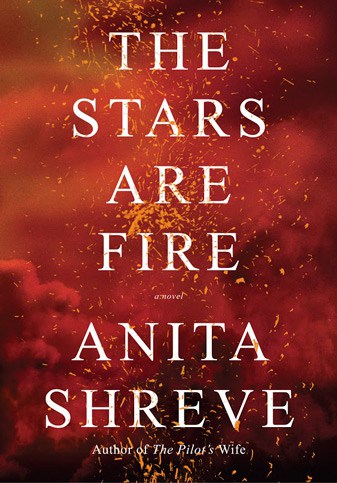When a woman is pushed to the edge, what will she do? That question sits at the heart of Anita Shreve’s novels. In her 1997 book “The Weight of Water,” which was made into a movie starring Sean Penn and Elizabeth Hurley, Shreve provides a fictionalized account of the infamous 1873 double-murder of two women on Smuttynose Island, and the mysterious woman who survived.
In her latest novel, “The Stars are Fire,” the push comes from another real-life New England disaster. In 1947, a season of severe drought led to a series of forest fires that swept through Maine in October. By the time the smoke cleared, 16 people had died, 200,000 acres of forestland had burned, and homes and communities throughout York County had been destroyed.
“The Stars are Fire” begins a few months before the fateful conflagration. Grace Holland, a wife and mother of two young children living in the fictional coastal town of Hunts Beach, faces a life she didn’t expect. Her marriage to her husband, Gene, is deteriorating rapidly, and she’s unsure where to turn for help. Her days are punctuated by household chores and childcare, with short breaks for visiting her neighbor and her mother. An unexpected pregnancy has made it all more difficult.
Then the fire arrives. With Gene gone as part of a volunteer fire crew, Grace is left to save herself and her children from the approaching flames. The tragedy levels Hunts Beach and upends Grace’s life. Gene is gone and their house is destroyed. Once confined to her small bungalow, Grace is forced out into the world, first to find shelter, and later to build a new life for herself and her children.
But, because Shreve enjoys seeing what her characters do under extreme pressure, the fire is only the beginning of Grace’s challenges.
Shreve had been scheduled to read from her new book at The Music Hall Loft in Portsmouth on May 3, but she canceled her tour due to an undisclosed illness. Prior to canceling her appearance, Shreve spoke to The Sound about researching the Great Fires, how she recreated the life of a 1940s housewife, and the benefits of tragedy.

As “The Stars are Fire” took shape in your mind, which came first, Grace or the Great Fires? Did one inspire the other, or was your interest in the Great Fires of 1947 the main impetus for the book?
That’s a great question, because the big difference between historical fiction and what I write is that, in historical fiction, you want to tell the story of the fire and get all the details in, so you might create a character to illustrate that history. What I do is the opposite — I use history in service of fiction. It’s a wonderful backdrop in which to place a character, and I was fascinated by what I learned, but the real story is Grace Holland and her bad marriage before, during, and after the fire.
I had heard about the fires years ago. A decade ago, I read a fascinating book about them, and one detail stuck in my mind that was of women having to go into the sea to save themselves. That detail came first. Then I began to imagine: Who is this woman? She’s Grace Holland, she has two children, she lives in a neighborhood of bungalows three streets back from the water, her husband is working on building the Maine Turnpike. That’s how the book began to spool out.
How did you approach researching the Great Fires?
My best source was the Portland Press Herald’s archives, because they had spent a better part of 10 days to two weeks (covering) the fires. It was on the front page every day. In those days, news reporting tended to be anecdotal, and so I was able to get some wonderful human interest stories. But the photographs are what really told me about the fire. You could see the danger and aftermath and what people faced simply by looking at the photographs.
You also provide a detailed picture of domestic life in the late 1940s. How did you research those details?
Well, for a lot of Grace’s domestic life, I used my mother as an example. Let me be quick to point out my parents had a very happy marriage for 56 years (laughs). But I used her chores — I remembered the wringer washer in the kitchen, the wash on the line. I remembered the baby carriage that was enormous and took up the entire hallway, and I remember my mother on the floor making slip covers and drapes, and the bungalow, and the way neighbors were essential because she couldn’t leave the house. She could only go as far as she could walk because she didn’t have a car. And I remember my father coming home on Thursday nights and us going food shopping together because he’d just gotten his paycheck.
Grace is tough and resilient, and the resolve that gets her through the fire only deepens as the novel goes on. How did her character develop as you were writing?
You don’t think the character is one thing; you develop them as you write. The sentences are often as surprising to the writer as the reader. It’s like, when you first see the character, it’s a skeleton coming to you out of the mist. … Occasionally, (characters) will go off on a tangent you’d never dream of. There were moments when Grace would be in the midst of dialogue with Rosie (her neighbor) and would say something and I’d think, “Oh, that’s interesting, I’ll go down that road.”
Were there particular moments that surprised you?
I didn’t exactly know what was going to happen with the men. I knew Grace pretty thoroughly by halfway through the book. The men were more difficult; I was able to understand them totally by the time I was done, but certain details about them surprised me as I was writing and inventing them.

Anita Shreve has canceled her book tour due to an illness. photo by Elena Seibert
I couldn’t help but see echoes of “Jane Eyre” in the book — a determined woman in search of an equal, a terrible fire, a brash, angry man with a secret. Was that in the book’s DNA? Were there other literary inspirations?
No, it doesn’t really work that way, and it’s certainly not “Jane Eyre.” I haven’t thought about that in ages. But you never know what’s in your subconscious that’s going to bubble up. … I read a lot, and everything I read becomes part of my conscious life.
On a similar note, the prose often comes in short bursts. In the 10 or so pages during which the fire rages through Hunts Beach, the text resembled newspaper reports. How did you settle on using that sort of style of short sections and present-tense narration?
I started out with vignettes right from the get-go and hadn’t even begun to go through the Press Herald archives. It’s a stylistic choice I made. … What’s missing is the connective tissue between vignettes, but when I read, I often find that connective tissue boring.
The Great Fires were unquestionably a tragedy, but, from Grace’s perspective, also a blessing. Can you talk a little about the complicated views we have of these kinds of disasters?
In Grace’s case, she has such a circumscribed life and mores during that period. There are certain subjects that are not spoken of, even if they’re doing great damage to your life. The fire … offers her a kind of liberation. She now has to make her own universe with her own set of rules and own parameters, and she does this out of necessity because she has to feed and clothe her family. She has to get a job, learn how to drive a car. … This is an over-used metaphor, but she’s a phoenix rising from the ashes. She learns how to be who she is.
Did you call on any of your own life experiences to inform that tra

